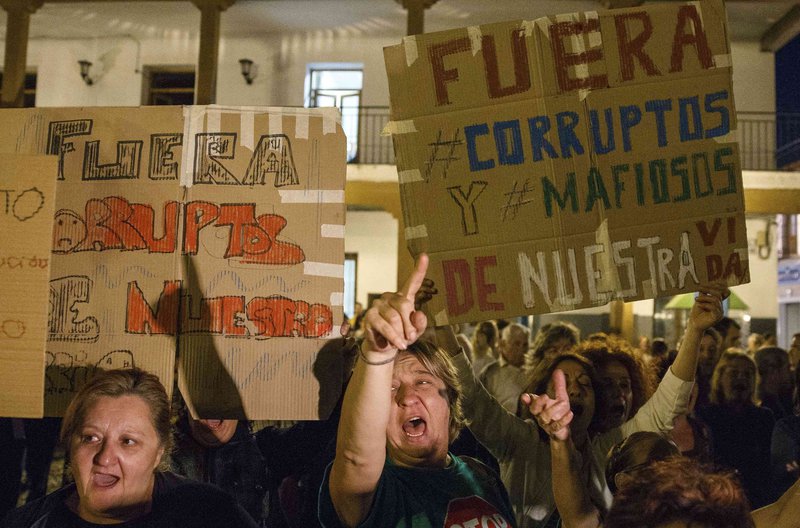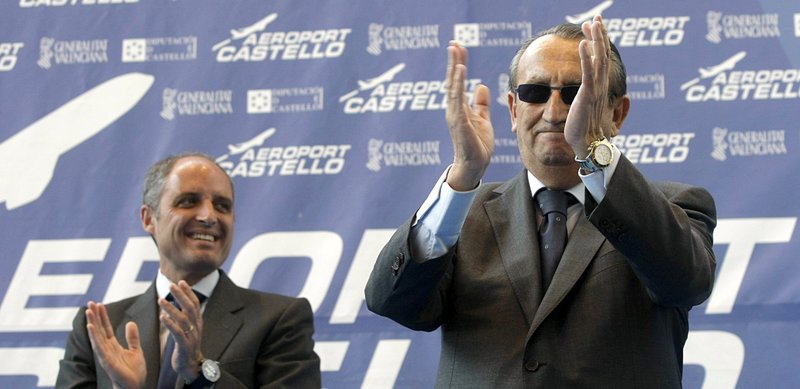A tour of political abuse
Valencia, Andalusia and the Balearic Islands are three of Spain's autonomous communities that have been most afflicted by cases of political corruption in recent years
Cases involve obstruction of justice, bribes, and influence peddling
On October 31 2009, thousands of people in Valencia took part in the first demonstration organised by the group, No a la Corrupció, calling for a renewal of democracy and the resignation of the then president of the Generalitat, Francisco Camps. The PP leader of Valencia had spent months at the centre of a media frenzy after he was implicated in the Gürtel corruption case.
Judge Baltasar Garzón accused Camps and other party members in the Valencia government of accepting bribes in the form of gifts from the organisation headed by Francisco Correa, keen to get public contracts worth more than five million euros. The case ended up in Valencia's high court, while the media published compromising information, including conversations between Camps and Correa's righthand man in Valencia, Álvaro Pérez 'El Bigotis'. However, these revelations did not stop Spanish prime minister Mariano Rajoy from allowing Camps and other indicted MPs to stand in the May 2011 elections, which the PP won with a landslide.
Two months later, the president of Valencia resigned after the case known as the “cas dels vestits” was opened. Camps portrayed himself as a martyr making a voluntary “sacrifice” so that Rajoy could win re-election. A month and a half later, however, Camps (and the former head of tourism, Rafael Betoret) was found not guilty. Despite his exoneration, the former president disappeared from front-line politics.
Yet, the “cas dels vestits” was just the tip of the iceberg as far as Valencian involvement in the Gürtel scandal, which included possible illegal funding of the PP. In all, the high court in Valencia recognised six different elements within the corruption investigation that implicated Correa and numerous others in the Camp's administration.
To give an idea of how far the rot went, examples such as the illegal funding of the PP can be cited, in which the falsifying of documents worth millions in public building contracts allegedly funded the electoral campaigns of 2007 and 2008, and also implicated former Valencia president, Vicente Rambla.
Another example is the so-called Fitur case, involving obstruction of justice, bribes, embezzlement and influence peddling in relation to the Gürtel companies, which implicated the former tourism minister, Milagrosa Martínez, and the fomer minister, Angélica Such.
Even the visit of Pope Benedict XVI to Valencia in July 2006 did not escape being tainted as it became clear that Correa's group and RTVV struck a deal to cover the visit. This case brought indictments for the then director of RTVV, Pedro García, and now, former president, Juan Cotino.
In fact, the dirty strands of the Gürtel case have riddled Valencia with investigations, mostly involving Correa's group and the Valencia Generalitat. This has even led to indicted PP delegates continuing to sit in the Valencia parliament, until the current president, Alberto Fabra, drew his now famous “red line”, insisting on resignations from indicted politicians, with differing results.
Yet, some suspected figures have been able to rely on political manoeuvrings in parliament by the PP to avoid prison. Perhaps the best example is Carlos Fabra. The former president of the Diputació and the PP of Castelló managed to evade prison for more than a decade after being sentenced to four years in prison for four offences. An application to the central government for a reprieve meant that his sentence was suspended by the high court while Madrid considered forgiving Fabra his sins. In the end, the minister of justice insinuated that the government was no longer predisposed to provide reprieves, and just weeks ago the cabinet announced it had turned down the petition.
The latest episode in the complex web of corruption cases affecting Valencia was the implication of the former deputy mayor of Valencia, Alfonso Grau, in the Nóos case.
Despite all of this, the País Valencià is not the autonomous community with the most cases of political corruption because, according to 2013 figures from the Consejo General del Poder Judicial, Andalusia has double the number of cases, 656, to the 250 in Valencia.
Andalusia
There is no one single Andalusian scandal, there are many. The corruption cases in the autonomous community involve hundreds of indictments and millions in embezzled funds. Under the umbrella term of Operation Malaya, more than 2.4 billion euros in laundered money has so far been seized. It is the municipal urban scandal par excellence in Spain. The ringleader, the former head of town planning in Marbella, Juan Antonio Roca, was called by one judge “the mayor in the shadows”. Three consecutive mayors of the town have been indicted (Julián Muñoz, Marisol Yagüe, Tomás Reñones), at one point leading the Spanish government to take the unprecedented measure of dissolving the local authority until the following elections, in 2007.
Roca had a Miró painting hanging in the bathroom of his luxury Malaga mansion, one piece of evidence seized when the operation began in March 2006. Currently in its third phase, Operation Malaya has since turned up dozens of Picasso paintings, a private plane and helicopter, a collection of 43 antique carriages, a hundred or so thoroughbred horses, palaces, hotels, stuffed elephants and hunting trophies.
Today there are more than a score of legal proceedings underway, prosecuting dozens of politicians, business people and lawyers for offences such as money laundering, obstruction of justice, influence peddling, embezzlement and so on. Some 50 of the 95 people accused have been sentenced and Roca himself is currently in prison (for a different scandal) while he and many of his associates await the verdict of the high court. Only recently, the popular singer Isabel Pantoja dodged a prison sentence for her part in the scandal.
Yet, Andalusia is also afflicted by another corruption case: the Expedientes de Regulación de Ocupación, or ERO, which has seen 229 people accused. This case involves the setting up and abuse of retirement funds by the socialist government of Andalusia, which has been in power in the community since 1980. While coverage of the 2012 elections focused on the scandal, the socialists managed to stave off government action thanks to an agreement struck with the Izquierda Unida party.
In the next few months, figures such as Pedro Sánchez and Susana Díaz could appear before the court, as could former presidents Manuel Chaves and José Antonio Griñán, both still active in politics. The supreme court recently began an investigation into the case to find out who was responsible for setting up a fund to pay for the early retirements of the ERO process, which the investigating judge believes was part of a system for redistributing public money.
So far, dozens of false retirements have come to light and evidence that many businesses were provided with public money on the basis of their connections. It is estimated that the ERO fraud could account for 855 million euros.
However, at the same time, another Andalusian scandal threatens to leave the other two in the shade: Operation Edu, linked with alleged fraudulent subsidies worth up to two billion euros supposedly to fund training courses for the unemployed and involving EU money. It is possible that the investigation may have uncovered the biggest ever scandal involving public money in Spain, tainting in the process unions, business associations and private companies. So far some 200 people have been investigated.
Balearic Islands
No discussion of the web of corruption running throughout Spain would be complete without looking at another area that is also under the control of the PP, the Balearic Islands. Jaume Matas, who was president of the archipelago from 1996 to 1999 and from 2003 to 2007, entered prison on July 28 2014 to serve a 9-month sentence for influence peddling, after his application to the central government for a reprieve was rejected. It is the second time that a minister from the Balearics has been sent to prison, after José Barrionuevo was sentenced in 1998 for the kidnapping of Segundo Marey.
Yet the sentence Matas is serving is only for one of the scandals in which he has been implicated. His current sentence is a result of his role in the Palma Arena case, now nearing completion. Yet, the man who served as environment minister for the Aznar government in the early 2000s is also to appear before the courts as part of the investigation into the Nóos scandal, which sees him facing a further five years behind bars. The former PP politician is also being investigated for his alleged role in illegal party financing.








